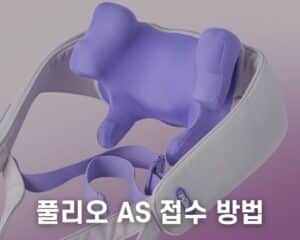풀리오 마사지기 추천, 종류, 가격 비교, 스펙 총정리 (Pulio)
이번 시간에는 국내 종아리 마사지기 1위 브랜드로 유명한 풀리오(Pulio)에 대해서 자세히 알아보려고 합니다. 현재 풀리오에서 판매하고 ...
마사지기
·
풀리오 넥풀러 목어깨 홈케어 원리, 효과, 가격, 내돈내산 후기는? (Pulio)
이번 시간에는 풀리오(Pulio)에서 판매하는 제품 중에서, 프리미엄 마사지기 라인에 해당하는 풀리오 넥풀러 목어깨 홈케어에 대해서 정리해보는 ...
헬스 케어
·
스파알 AS 고객센터, 고장 접수 후기 및 비용 (SPAR)
스파알(SPAR)은 2024년 상반기에 런칭한 프리미엄 마사지기 브랜드로, 권은비 씨가 모델로 활동하면서 유명세를 타고 있습니다. 그 중에서도 ...
생활 정보
·
풀리오 AS 고객센터, 고장수리 접수 후기 및 비용 (Pulio)
이번 시간에는 풀리오 AS 고객센터에 고장수리 접수를 하는 방법을 구체적으로 알아보도록 하겠습니다. 평소보다 마사지압이 눈에 띄게 ...
생활 정보
·
무선 목어깨 마사지기 추천 비교 순위 TOP 7 (가격 스펙 총정리)
최근 들어 무선 목어깨 마사지기를 구입하시는 분들이 상당히 늘어나는 추세입니다. 하지만 마사지기 브랜드가 워낙 다양하기 때문에 ...
마사지기
·
넥앤프로 어깨 마사지기 가격 스펙 내돈내산 후기는? (클로 할인코드)
안녕하세요 정리하는 뇌입니다. 이번 시간에는 주식회사 클로에서 판매하고 있는 넥앤프로 어깨 마사지기에 대하여 자세히 정리해보려 하는데요. ...
마사지기
·
휴플러스 어깨 안마기 내돈내산 후기, 가격, AS 정보 (코드제로)
안녕하세요 정리하는 뇌입니다. 이번 시간에는 현재까지 200만대나 완판된 휴플러스 어깨 안마기 코드제로 시리즈에 대해서 자세히 알아보려 ...
마사지기
·
소유 안마기 내돈내산 후기, 가격, 할인코드 공유 (이유즈 목어깨 마사지기)
최근 국내에 무선 목어깨 마사지기 열풍이 불면서 다양한 브랜드에서 제품을 출시하고 있습니다. 오늘은 그 중에서도 이유즈(EUS)에서 ...
마사지기
·
스파알 포터블 목어깨 마사지기 내돈내산 후기 스펙 할인코드 (권은비 안마기)
안녕하세요 정리하는 뇌입니다. 이번 시간에는 국내에서 권은비 안마기로 유명한 스파알 포터블 목어깨 마사지기에 대해서 자세하게 정리해보려 ...
마사지기
·














